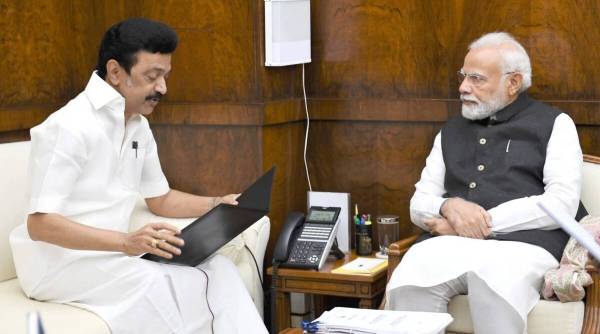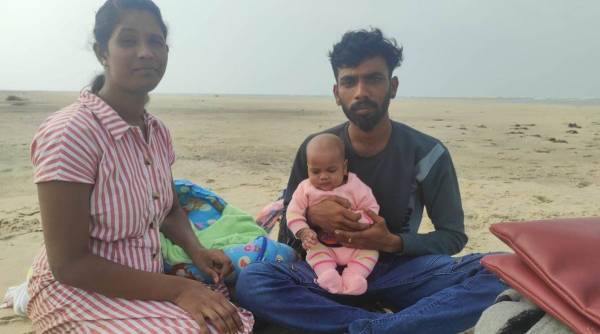Behind Stalin’s Lanka aid move: state rights assertion, DMK’s diaspora image makeover

The Tamil Nadu Assembly’s move to pass a resolution Friday urging the Centre to allow the state government to send humanitarian aid to the people of Sri Lanka came in the wake of the BJP-led central government not responding to its similar requests made earlier. The resolution was brought by the DMK-led government in the midst of its escalating tussle with Governor R N Navi over various issues.
After moving the resolution, which was passed unanimously by the House with the support of all parties including the BJP, Chief Minister and DMK president MK Stalin again wrote to Prime Minister Narendra Modi, urging him to issue necessary directions to the Ministry of External Affairs to process and facilitate the early movement of essential relief items such as food and medicines that the Tamil Nadu government has proposed to send to the neighbouring country, which has been reeling under an unprecedented economic crisis.
The state government’s initial plan is to send 40,000 tonnes of rice worth Rs 80 crore, 137 types of life-saving medicines valued at Rs 28 crore, and 500 tonnes of milk powder worth Rs 15 crore to Sri Lanka.
A month ago, during his visit to New Delhi, CM Stalin had met PM Modi and requested him to permit the state government to send humanitarian aid to Sri Lankans, pointing out that many of them were fleeing the island country and coming to the state through the sea route. Stalin had also written a letter to external affairs minister S Jaishankar to follow up on the request. However, so far the Government of India has not responded to the state government’s pleas.
With the question being raised in Tamil Nadu why the Centre has remained indifferent to its urgings despite a staggering crisis gripping the neighbouring country, a retired political science professor of University of Madras, Ramu Manivannan, the author of “Sri Lanka: Hiding the Elephant” — a book which documents war crimes and atrocities committed during the last leg of Lanka’s war against LTTE rebels in 2009 — said there could be no reason for the Indian government to delay this decision. “Neither the Tamil Nadu’s gesture to help Sri Lanka sets a precedent as India and states have done it earlier too on many occasions. There were instances of West Bengal asking the Union government to address and help people when the Bangladesh refugee crisis was playing out. Help is crucial for Sri Lankans. When Sri Lanka has no reason to take a stand against supplies of rice, medicines and milk powder, the Indian government should realise that this is a humanitarian crisis and these materials should reach the people immediately,” he said.
 Tamil Nadu Chief Minister MK Stalin with Prime Minister Narendra Modi. (Twitter/@CMOTamilnadu)
Tamil Nadu Chief Minister MK Stalin with Prime Minister Narendra Modi. (Twitter/@CMOTamilnadu)
India had extended similar assistance to Sri Lanka earlier too. Even without the consent of the Lankan government, in 1987, the then Rajiv Gandhi government initiated unprecedented steps to send humanitarian aid there after its then J R Jayawardene government had imposed an economic blockade on the Tamil-populated Northern Lanka amid a war-like situation. Popularly known as “parippu drop”, India had then deployed many aircraft, escorted by fighter jets, to airdrop food packets and provisions over the Jaffna peninsula. A similar mission was repeated in 2008, too, when New Delhi had sent a shipload of relief materials to Colombo meant for people in the Northern provinces.
A top state bureaucrat said the resolution adopted by the Assembly could also be seen as an “extension of the growing awareness about the state rights”. There was no reply from the Centre even after the CM had taken up the issue with the PM and had also written to him, which prompted the state government to push this official resolution through the House, the official said. “This strengthens the perception that the Centre is totally indifferent to decisions taken by an elected state government. If at all there is a response finally, they would be like these: either an unconditional ‘yes’ or ‘no’. Otherwise, they will urge the state to send the relief materials via the Centre and decide what to send.”
‘Relief for everyone in Sri Lanka, not only Tamils’
The Assembly resolution stated that the Stalin government intends to extend humanitarian aid to all Sri Lankan citizens. When the state government first made the proposal, it was seen as a bid to help Sri Lankan Tamils alone, which triggered a debate among many Sri Lankans, including Sinhalese, and drew criticism.
Many Tamils feel that “nobody in Sri Lanka cared when Tamils suffered there”. However, many of them concede that Lanka is currently in the throes of an unprecedented crisis and that “help should be extended to everyone in that country”.
Manivannan, however, said the Lankan government should also understand that help should reach everyone, not only Sinhalese. “I am saying this because there is a precedence to Sinhalese dispensation not extending benefits to Tamils. There is a well-established record of the partisan attitude of the Sri Lankan government, be it Tsunami relief and rehabilitation or in cases related to the post-war period,” he said, adding “how the government conducts itself is more important than people’s conduct”.
 Gajendran (24), his wife Mary (22) and their son Nijath were among six rescued by the Coast Guard. (Express Photo)
Gajendran (24), his wife Mary (22) and their son Nijath were among six rescued by the Coast Guard. (Express Photo)
Stalin’s bid to mend fences with Tamil diaspora
The DMK’s track record over the Sri Lankan Tamil cause has always been mixed, with the AIADMK icons like M G Ramachandran and J Jayalalithaa considered to have scored better than the former’s stalwart M Karunanidhi on the issue. Moreover, the Tamil diaspora — Tamils in Sri Lanka and other parts of the world — have often raked up the charge that late Karunanidhi had neither sacrificed power in Delhi nor did anything to prevent the massacres in Northern Lanka during the last phase of the war, when the DMK was part of the UPA government at the Centre.
Stalin has now been making bids to ensure a makeover of the DMK’s perceived poor image in this backdrop. Soon after he came to power, the DMK chief announced a welfare package worth Rs 317 crore to rebuild houses of Sri Lankan Tamil refugees living in the state. Their education and job opportunities were among the areas for which the DMK government allocated funds. The Assembly resolution also seems to be part of his efforts to address his party’s “legacy problem” on the issue.

